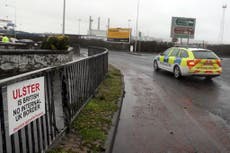Tory Brexit hardliners call on Boris Johnson to tear up Northern Ireland arrangements
European Resarch Group call for new rules on exports after weeks of disruption
Your support helps us to tell the story
From reproductive rights to climate change to Big Tech, The Independent is on the ground when the story is developing. Whether it's investigating the financials of Elon Musk's pro-Trump PAC or producing our latest documentary, 'The A Word', which shines a light on the American women fighting for reproductive rights, we know how important it is to parse out the facts from the messaging.
At such a critical moment in US history, we need reporters on the ground. Your donation allows us to keep sending journalists to speak to both sides of the story.
The Independent is trusted by Americans across the entire political spectrum. And unlike many other quality news outlets, we choose not to lock Americans out of our reporting and analysis with paywalls. We believe quality journalism should be available to everyone, paid for by those who can afford it.
Your support makes all the difference.The damaging economic fallout from Boris Johnson’s EU divorce deal has provoked unrest in the Leave camp, with hardline Tory Brexiteers calling on the prime minister to tear up arrangements for Northern Ireland which he negotiated and they backed in parliament.
In a report today, the European Research Group called on the prime minister to activate Article 16 of the Northern Ireland protocol, which allows him to suspend the agreement if it causes “serious economic, societal or environmental difficulties” or diversion of trade.
The move came as Mr Johnson’s government appeared to be backing away from confrontation with Brussels on the issue.
After a letter earlier this month threatening to invoke Article 16 if the EU did not deliver “rapid action” to revise the arrangements, Michael Gove last night concluded a meeting with European Commission vice-president Maros Sefcovic with a joint agreement to ensure the “proper implementation” of the existing protocol.
The ERG, believed to number around 50 Tory MPs, is proposing a “mutual enforcement” regime which they insist would get rid of the customs border in the Irish Sea created by the protocol without requiring the creation of a hard border in contravention of the Good Friday Agreement.
The move comes as a leading member of the group acknowledged that the measures imposed as a result of the UK transitioning out of the EU on 1 January have led to empty shelves in Northern Ireland supermarkets, increased costs and bureaucracy for hauliers supplying the province and disruption to the day-to-day life of its residents.
But ERG deputy chair David Jones rejected suggestions that the Brexiteer group was turning its back on an arrangement which it had itself brought into effect by voting for Mr Johnson’s withdrawal agreement in 2019.
“I wouldn’t say we were overjoyed to be supporting the contents of the of the Northern Ireland protocol, but we took comfort from the fact that both sides were obliged under its terms to look for alternative arrangements,” Mr Jones told The Independent.
“Unfortunately, since the end of the transition, the EU has shown no sign of looking for alternative arrangements. That is a breach of an obligation on the part of the EU.”
Mr Jones said that the shortcomings of the protocol had become apparent over the past two months in the shape of disruption to supermarket supply chains, with stores having to restock with items from EU-based companies, trucks returning empty to Northern Ireland from mainland Britain and difficulties for ordinary residents wanting to take pets over the border.
He said that the current disruption was coming during a “grace period” before controls are imposed in full in areas like supermarket supplies.
“If these difficulties are experienced now, what is likely to be the impact once the grace periods finish?” he asked. “It is arguable that diversion of trade is already happening, with Sainsbury’s shelves having to be stocked with goods from EU suppliers”
The mutual enforcement regime proposed by the ERG report would require Northern Ireland and the Republic each to take responsibility to ensure that their exporters abide by agreed rules, which the report claims would do away with the need for onerous checks at Northern Irish ports.
Downing Street insisted that it stands by the demands set out in Mr Gove’s 2 February letter to Mr Sefcovic, which called for an extension of grace periods to January 2023.
Mr Johnson’s press secretary Allegra Stratton said that Gove and Sefcovic were working through “outstanding problems” with the protocol.
“They are very clear-eyed about what the problems are,” she said. “The two parties are on the case. The letter still stands.”





Join our commenting forum
Join thought-provoking conversations, follow other Independent readers and see their replies
Comments